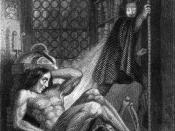Throughout the entire novel, Shelley's love affair with nature adding drama and excitement heightened the most notable scenes. She even uses metaphors to portray his childhood. When remembering his childhood, his recollection is "like a mountain river from ignoble and almost forgotten sources." (Shelley) Nature is the most important role in Victor's well being, more so than any driving force in the story. Victor's repeatedly drawn to nature for solstice rather than his own family or friends. His fixation about nature gets more absurd as he turns away from people over and over. Shelley plays this "theme" throughout the story, using nature to express human feelings. (Notes)
In chapter two, Victor confesses "it was the secrets of heaven and earth" that held his attention and, therefore, his cravings to understand natural philosophy. (Shelley) "When I was about fifteen years old we had retired to our house near Belrive, when we witnessed a most violent and terrible thunder-storm.
It advanced from behind the mountain Jura, and the thunder burst at once with frightful loudness from various quarters of the heavens. I remained while the storm lasted, watching its progress with curiosity and delight. As I stood at the door, on a sudden I beheld a stream of fire issue from an old and beautiful oak, which stood about twenty yards from our house; and so soon as the dazzling light vanished, the oak had disappeared, and nothing remained but a blasted stump. When we visited it the next morning, we found the tree shattered in a singular manner. It was not splintered by the shock, but entirely reduced to thin ribbons of wood. I never beheld anything so utterly destroyed." (Shelley)
Taken from my close-analysis paper, nature plays a dominant role, throughout the story. The violent and terrible thunderstorm held Victor...


